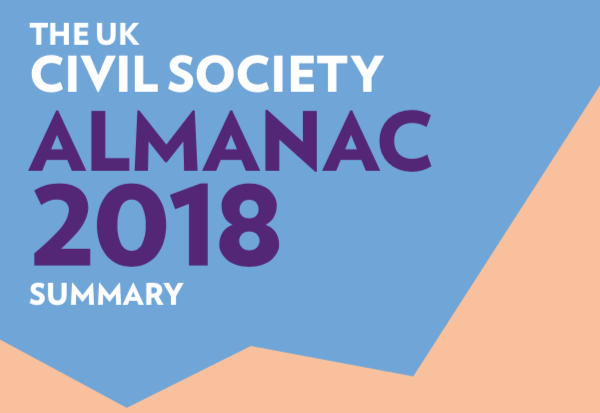
Institute of Fundraising launches access fund to support diversity in sector
May 16, 2018
44 countries represented at Giving Tuesday summit
May 16, 2018Total income for the UK charity sector reached a new high of £47.8 billion (or €54.4bn) in 2015/16: a 4% increase on the previous year, with donations accounting for £7.8bn, according to the NCVO UK Civil Society Almanac 2018.
However, while overall the sector’s finances now seems to be back to the levels seen before the recession (almost ten years ago), smaller charities – which make up 82% of the sector – have not managed to recover the value of their assets to the same extent as well as larger organisations.
Income & spend
NCVO‘s Almanac shows that of the £47.8bn income, £22.3bn came from individuals, with the government providing £15.3bn – £186m less (1%) than the previous year. The growth in income from individuals was predominantly through earned income such as membership fees or charity shop sales, which amounted to £11.4bn, while voluntary income from individuals (such as legacies and donations) reached £10.9bn. Donations still account for the largest share of voluntary income from individuals (35%), and grew slightly by 1%, to £7.8bn with legacies reaching £3.1bn. Earned income from the public increased by 8% to £11.4bn.
Sector spend almost equalled income in 2015/16, reaching £46.5bn, and an increase of 2.6% on the previous year. The majority, £33.1bn, went on charitable activities, with £6.5bn spent on grants, £6.4bn on generating funds, and £0.6bn on governance.
Sir Stuart Etherington, chief executive of NCVO, said:
“While some charities are going from strength to strength, others, smaller charities in particular, are struggling with the ongoing local government spending squeeze, or being pushed out of an increasingly competitive public services market.
“Income from the public was strong in the year under examination, but many have suggested that the transition to a longer-term approach to fundraising methods and the impact of changes to data law could mean future fundraising returns will be lower in the short term.
“The sector as a whole may have recovered from the impact of the recession, but there is clearly no shortage of risks out there for charities.”
Changing workforce
The Almanac also looks at the sector’s workforce in the UK, showing how it is growing and changing. In June 2017, it employed over 880,000 people: up 4% on the previous year. A third of the sector is male, compared to 59% in the private sector, but the proportion of men in the voluntary sector workforce is slowly increasing, rising from 35% to 37% between June 2016 and June 2017.
The majority – over 94% – of employees in the voluntary sector come from the UK, with 4% from another European country, and 3% from the rest of the world. The report identifies that the number of EU nationals working in the sector has decreased by 20% since June 2016, bringing the number of EU employees to 2014 levels.
The Almanac also estimates the sector’s worth to the UK. By looking at the number of people employed and the gross value added (GVA), it estimates the sector’s GVA to be £15.3bn: roughly similar to the GDP of Estonia in 2016, employing 880,556 people (3% of the total UK workforce), and with the value of formal volunteering estimated at £22.6bn in 2015.




